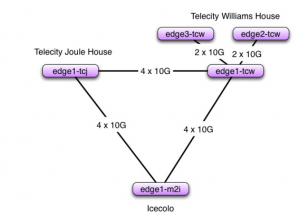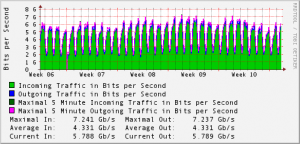James Blessing discusses technology regulatory issues he sees that should be addressed by the next government.
Since we have a potential change of government coming up, it might be useful to see how well the current one has been doing in the telecoms and technology space and where the next one might repeat the same mistakes. These are the random scribblings of an individual, and not a position paper by ISPA or any company that I work for (though the are probably people in those organisations who agree with the sentiment).
There is a fine line that people in business need to tread when trying to get the government involved in something. Whilst there is often a space for government involvement, there is also some risk that they will try to dominate the process and move it from being a good idea to something that actually would have been better for all of us if they’d never been involved.
Let’s start with the biggest heffalump in the room, BDUK. Whilst the idea of government injecting funds into various projects to make sure the country’s infrastructure is the best in the world and no region gets left behind, most of the people in industry recognised that BT would win most (if not all) of the contracts. This isn’t because of the evil machinations of the government or BT (much though people would like to believe that) but rather because the “scheme” was designed by civil servants with a paranoia that Eurocrats would jump on any project that thought outside of the most convenient box.
The “good” news is that the third round of funding seems to be focusing on more creative solutions, but I fear for those communities that are going to be left with solutions that will leave them far behind their dense cousins in the cities. The bad news is that BT’s obsession with copper (which they have a lot of) rather than fibre (which they have a lot of too) seems to be continuing with G.fast. In an ideal world, someone in government would recognise that fibre is the way forward, but it seems that only the smaller altnets are the ones who are delivering it.
Moving on from infrastructure, we have the fun that is monitoring and content. The two largest parties seem to have developed an unhealthy obsession with “out-nannying” each other (and many individuals in other parties have agreed with them on occasion). The last two governments have both tried (and failed for different reasons) to introduce widescale, automated watcher programmes that keep an eye on all internet activity using potential terrorism threat and “think of the children” as their rallying cries. If I were a betting man, then I’d put money that without the more liberal elements in the next government, we’ll see the same legislation in a new format raise its head over the parapet. It’s as if Sir Humphrey’s spirit lives long around the echelons of Whitehall.
Indeed, by using the “think of the children” approach, we also appear to channelling the late Mary Whitehouse in terms of restricting access to “objectionable content”. Whilst I agree that children shouldn’t be exposed to it, the approach being used where end users get no choice in the matter removes “parental” responsibility in terms of their own media, literacy and educational development; as well as teaching an entire generation to bypass security settings to get to the things they want to. For one, I pity the IT admins of the future, who have to deal with a generation who have been conditioned that the only way to source content is to bypass access control.
But what of looking forward? What should we be pushing our government (and politicians) to do from their ivory tower? Personally, I think it comes down to number of (relatively) simple steps that they could promote, and then leave the market/society to work out:
Education – So much promise has been shown with the Raspberry Pi and the maker community when it comes to what can be done when you set the mind free, but schools’ curricula have become so restricted to focusing on “now” and not encouraging “future”, that teachers are prevented from exploiting these developments purely for the ability to create. Not everyone wants to be a web developer, software designer or network engineer but letting kids run wild with technology is the only way new things happen. We need another generation of hackers – in the original sense of the word, meaning people who want to play around with things to find out how they work rather than emo kids who hang around in basements with green characters on a black screen. In fact we should probably just clone Tom – http://www.tomscott.com/
Infrastructure – Many new different technologies are being predicted as being “just around the corner” (the cynic inside says that they’ve been just around the corner since the 80’s but hey…), the Internet of Things, Driverless Cars, 5G, 4K, TLAs, Virtual Reality, Distributed Energy – all of which will need underlying infrastructure to ship control data. Whilst there are frequently voices raised exclaiming that we’re in the top N countries in the world for XYZ, and that we should be proud to be there, surely we should be setting our sight and goals higher? Rather than settling for 25mbps to 90% of the country, we should be looking at delivering 1Gbps in the next 5 years to everyone, and then how we move from 1G to 10G 5 years later. We might decide we can’t quite make it on that time scale and lower the goals a bit, but, at the moment, we’re shooting too low. In 2000, broadband (when it was still called DSL) managed 512k maximum to less than 20% of the country, 10 years later the average was 5Mbps and the coverage was 71%. Our minimum goal should be 50mbps average by 2020, and to hit that, we should be pushing infrastructure capabilities and formats now!
IPv6 – Whilst the previous two are rather grand sweeping topics that need lots of things to happen and a longer period of time before we see the greatest benefits, rolling out IPv6 everywhere is a much more pressing issue. The IoT is going to consume vast amounts of address space, address space that we’ve already run out of. The security services are demanding traceability of end users, and more networks are hiding them as they cope with a lack of space. In both cases, deploying IPv6 now, where ever and when ever possible, will help. It’s painful to watch clever people come up with more and more crazy schemes to share address space when IPv6 would solve the problem. For politicians, this is a great thing to jump on, its easy to measure success and government involvement is pressure on organisations rather than central financial investment – just include it as a requirement in all government tenders (preferably pushed up to an EU level as well) and see how fast suppliers start adapting.
Open data – The other easy win, the data exists, people want the data – make it available. Okay, you’d lose some revenue from the postcode database but everyone’s life will be slightly better as there is no longer a reason not to include postcode lookup in applications (other than laziness, and we can let market forces deal with that). “Publish and be damned” I say, and its great to see http://data.gov.uk/ already taking baby steps, but a change of government is an opportunity to push this issue forward at all levels.
And with that I’ll get my coat, take my soap box away and find another crowd to harangue.
James Blessing is currently CTO of Keycom PLC, a managed services provider. He has over twenty years of experience in internet technologies. Previously he was Strategic Relations Manager, EMEA at Limelight Networks, COO at Entanet, technical support manager and technical development manager at Zen Internet; senior project manager at Eunite; senior producer at Kiss102 and Kiss105; and a technical director at Net Nannies. James is also chairman of the trade body ISPA.
Other political week posts on trefor.net:
James Firth on why government should stop looking to big corporates for tech innovation
Gus Hosein on Data Protection Reform and Surveillance
The Julian Huppert crowd funding campaign here
Paul Bernal suggests government should hire advisers who know what they are doing
Domhnall Dods on Electronic Communications Code reform
See all our regulatory posts here.





